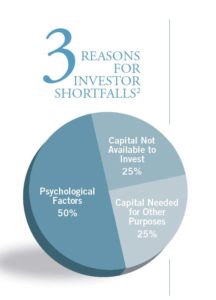Economist Benjamin Graham, author of the landmark book on investing, The Intelligent Investor, proposed:
“In the short run, the market is a voting machine but in the long run, it is a weighing machine.”
“While enthusiasm may be necessary for great accomplishments elsewhere, on Wall Street it almost invariably leads to disaster.”
“The true investor scarcely ever is forced to sell his shares, and at all other times he is free to disregard the current price quotation. He need pay attention to it and act upon it only to the extent that it suits his book, and no more. Thus the investor who permits himself to be stampeded or unduly worried by unjustified market declines in his holdings is perversely transforming his basic advantage into a basic disadvantage. That man would be better off if his stocks had no market quotation at all, for he would then be spared the mental anguish caused him by other persons’ mistakes of judgment.”
With all the media attention given to the markets on a daily basis, we can lose sight of what we are actually experiencing when investing in various assets. We see an index such as the Dow Jones Industrial Average1 rise or fall 100 points on a daily or even hourly basis. Our immediate thought, which is the emotional component of investing, is to attempt to understand what this means to our bottom line.
It is human nature to respond in a manner to protect ourselves. What are we protecting? Our future income, our retirement dream, our ability to live in the same manner we are living today without a paycheck every couple of weeks? All are valid concerns, but it would help to understand what is really happening in a volatile market.
So what is happening when markets rise or fall on a daily or even hourly basis? Actuality has been clouded by ubiquitous media attention and the ability to check our account value minute by minute, which drive us to protect ourselves at every turn. The global markets are business valuation tools. Every second of every day there are pension funds, endowments, individual investors, etc., buying and selling these businesses based on their expectations of net profits. What will their profits be? These buyers and sellers are brought together in these markets; ownership of these companies trades hands on a second-by-second basis. Consider the following; how will potentially slower growth in overseas economies, potentially higher domestic interest rates, lower energy prices, technology changes and population growth affect the profit of businesses throughout the globe? This is a question that no individual can answer exactly – unless you have the proverbial crystal ball.
As markets rise or fall in the short term, supply and demand are at work. When markets decline on negative news, a shorter-term investor might consider that the news will cause the profits of a particular company to decline. If more investors subscribe to this theory of declining future profits, more sellers than buyers, the price will decline. For example, put three investors in a room all owning equal shares of ABC stock, two of whom want to sell their ownership and one of whom wants to buy. The price declines because supply is greater than demand. Flip the example to two buyers and one seller. The seller can name his price; the value is increasing. Now consider these examples on a macro level. This is why global markets increase or decrease on a daily basis; it is simply about the mix of buyers and sellers.
This can explain the anxiety we feel when the markets decline. When there are more sellers than buyers, it is a buyer’s market. We would appreciate this opportunity when purchasing a new home or at Christmas time when our children’s lists seem a mile long.
Psychology: Behavioral biases that lead to poor investment decision-making are the single largest contributor to underperformance over time. DALBAR defined nine of the irrational investment behavior biases specifically3:

Loss Aversion
The fear of loss leads to a withdrawal of capital at the worst possible time. Also known as “panic selling.”
Narrow Framing
Making decisions about part of the portfolio without considering the effects on the total.
Anchoring
The process of remaining focused on what happened previously and not adapting to a changing market.
Mental Accounting
Separating performance of investments mentally to justify success and failure.
Lack of Diversification
Believing a portfolio is diversified when in fact it is a highly correlated pool of assets.
Herding
Following what everyone else is doing. Leads to “buy high/sell low.”
Regret
Not performing a necessary action due to the regret of a previous failure.
Media Response
The media has a bias to optimism to sell products from advertisers and attract view/readership.
Optimism
Overly optimistic assumptions tend to lead to rather dramatic reversions when met with reality.
The biggest of these problems for individuals is the “herding effect” and “loss aversion.” These two behaviors tend to function together, compounding the issues of investor mistakes over time. As markets rise, individuals are led to believe that the current price trend will continue to last indefinitely. The longer the rising trend lasts, the more ingrained the belief becomes until the last of the “holdouts” finally “buy in” as the financial markets evolve into a “euphoric state.” As the markets decline, there is a slow realization that this “decline” is something more than a “buy the dip” opportunity. As losses mount, the anxiety of loss begins to mount until individuals seek to “avert further loss” by selling. This behavioral trend is counter-intuitive to the “buy low/sell high” investment rule.
In the end, we are only human. Despite our best intentions, it is nearly impossible to be devoid of the emotional biases that inevitably lead to poor investment decision-making over time. This is why all great investors have strict investment disciplines that they follow to reduce the impact of their emotions.
As the markets rise and fall, whether a euphoric bull market or a depressing bear market, remember what we are actually doing when investing. We are either loaners as bond investors or owners as stock investors. Think about the emotional sellers driving down price. Do we become a seller creating more of a buyers’ market? Or do we become a buyer and capitalize on the emotional decisions made by anxious investors. In the short run, markets will experience the anxiety of discovering a fair value. In the long run, population and technology growth will drive global economies higher. The biggest risk in investing is taking the money at the wrong time. For this, we asset allocate; that is, we manage the relationship between loaning and owning. For now, put the blinders on, and do not concern yourself with today’s price. Rather, look forward to the longer term value of your assets.
IMPORTANT DISCLOSURES
The information included in this document is for general, informational purposes only. It does not contain any investment advice and does not address any individual facts and circumstances. As such, it cannot be relied on as providing any investment advice. If you would like investment advice regarding your specific facts and circumstances, please contact a qualified financial advisor.
Any investment involves some degree of risk, and different types of investments involve varying degrees of risk, including loss of principal. It should not be assumed that future performance of any specific investment, strategy or allocation (including those recommended by HBKS® Wealth Advisors) will be profitable or equal the corresponding indicated or intended results or performance level(s). Past performance of any security, indices, strategy or allocation may not be indicative of future results.
The historical and current information as to rules, laws, guidelines or benefits contained in this document is a summary of information obtained from or prepared by other sources. It has not been independently verified, but was obtained from sources believed to be reliable. HBKS® Wealth Advisors does not guarantee the accuracy of this information and does not assume liability for any errors in information obtained from or prepared by these other sources.
HBKS® Wealth Advisors is not a legal or accounting firm, and does not render legal, accounting or tax advice. You should contact an attorney or CPA if you wish to receive legal, accounting or tax advice.
